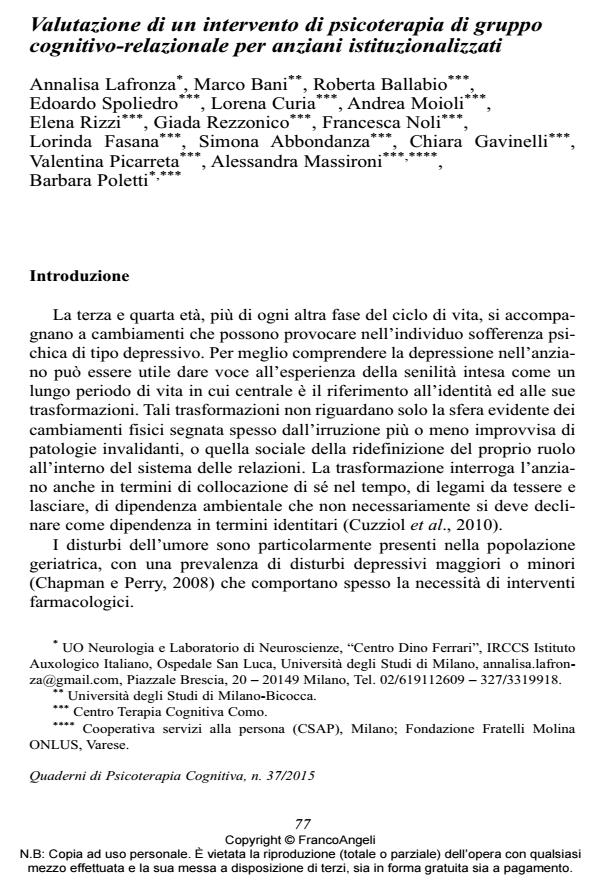Evaluation of an intervention of cognitive-relational group psychotherapy with institutionalized older adults
Journal title QUADERNI DI PSICOTERAPIA COGNITIVA
Author/s Annalisa Lafronza, Marco Bani, Roberta Ballabio, Edoardo Spoliedro, Lorena Curia, Andrea Moioli, Elena Rizzi, Giada Rezzonico, Francesca Noli, Lorinda Fasana, Simona Abbondanza, Chiara Gavinelli, Valentina Picarreta, Alessandra Massironi, Barbara Poletti
Publishing Year 2015 Issue 2015/37
Language Italian Pages 12 P. 77-88 File size 118 KB
DOI 10.3280/QPC2015-037005
DOI is like a bar code for intellectual property: to have more infomation
click here
Below, you can see the article first page
If you want to buy this article in PDF format, you can do it, following the instructions to buy download credits

FrancoAngeli is member of Publishers International Linking Association, Inc (PILA), a not-for-profit association which run the CrossRef service enabling links to and from online scholarly content.
Depression in institutionalized older adults is a critical topic in literature, given the impact of this problem on general medical conditions and the relational difficulties with these kind of patients. The present paper discusses a six-months cognitive-relational group psychotherapy intervention that includes, alongside the more traditional cognitive interventions on thoughts and feelings, a narrative intervention, focusing mainly on the relational dimension emerging from the discussion of themes which are crucial in the work with older adults, such as the concepts of loss, dependency and relationship with own body. 34 patients have been enrolled, with MMSE score > 22 and GDS score > 6; 18 of them completed the treatment based on group psychotherapy and were assessed according to depression levels (GDS) and assertiveness (SIB) at baseline, one month, 3 months and at the end of the intervention. Results have shown a significant reduction in GDS and SIB-discomfort scores and an improvement in relational abilities and assertiveness. These preliminary results suggest that cognitive-relational group psychotherapy represents both an effective intervention in the treatment of depression and an improvement of relational abilities that might be well implemented in residential institutions.
Keywords: Depression, group psychotherapy, cognitive-relational therapy, older adults
- American Psychiatric Association (2000). Diagnostic and Statistical Manual of Mental Disorders, Fourth Edition, Text Revision (DSM-IV-TR). Washington, DC: APA (trad. it.: DSM-IV-TR. Manuale diagnostico e statistico dei disturbi mentali. Quarta edizione. Text Revision. Milano: Masson, 2001).
- Arrindell W.A., Bartolini C., Sanavio E. (1999). Versione italiana della “Scale for Interpersonal Behavior”: fedeltà, stabilità e validità concorrente. Psicoterapia Cognitiva e Comportamentale, 5: 99-107.
- Chapman D.P., Perry G.S. (2008). Depression as a major component of public health for older adults. Preventing Chronic Disease, 5, 1: A22.
- Cherubini A. (2006). La depressione in età avanzata: dalla epidemiologia alla clinica. Giornale di Gerontologia, 54, Suppl. 2: 18-24.
- Cuzziol P., Castelnuovo G., Molinari E. (2010). La depressione nel’età geriatrica. In: Zacchetti E., Castelnuovo G., a cura di, Psicologia clinica della depressione. Esperienze cliniche tra medicina e psicologia. Milano: FrancoAngeli.
- Djernes J.K. (2006). Prevalence and predictors of depression in populations of elderly: a review. Acta Psychiatrica Scandinavica, 113: 372-387. Folstein M.F., Folstein S.E., McHugh P.R. (1975). “Mini-mental state”. A practical method for grading the cognitive state of patients for the clinician Journal of psychiatric research, 12, 3: 189-98. DOI: 10.1016/0022-3956(75)90026-
- Lyness J.M., Kim J., Tang W., Tu X., Conwell Y., King D.A., Caine E.D. (2007). The clinical significance of subsyndromal depression in older primary care patients. The American Journal of Geriatric Psychiatry, 15, 3: 214-23.
- Lyness J.M., Chapman B.P., McGriff J., Drayer R., Duberstein P.R. (2009). One-year outcomes of minor and subsyndromal depression in older primary care patients. International Psychogeriatrics, 21, 1, 60-68.
- Moser F., Pezzati R., Luban-Plozza B. (2002). Un’età da abitare. Identità e narrazione nell’anziano. Torino: Bollati Boringhieri.
- Mulsant B.H., Ganguli, M. (1999). Epidemiology and diagnosis of depression in late life. Journal of Clinical Psychiatry, 60, Suppl 20: 9-15.
- Musicco M., Bianchetti A., Caltagirone C., Mecocci P., Pirfo E., Salvioli G., Senin U., Trabucchi M., Vampini C. (2007). Il trattamento della depressione nell’anziano. Documento di Consenso dell’Associazione Italiana di Psicogeriatria. Psicogeriatria, Suppl. 1: 1-41.
- Pezzati R. (2006). L’anziano. In: Bara B.G., a cura di, Nuovo Manuale di Psicoterapia Cognitiva. Vol. 3. Torino: Bollati Boringhieri.
- Sheikh J.I., Yesavage J.A. (1986). Geriatric Depression Scale (GDS): recent evidence and development of a shorter version. Clinical Gerontology, 5, 1/2: 165-173. DOI: 10.1300/J018v05n01_0
- Wilson K., Mottram P.G. Vassilas C. (2008). Psychoterapeutic treatments for older depressed people. Cochrane Database of Systematic Reviews, 1: CD004853. DOI: 10.1002/14651858.CD004853.pub
Annalisa Lafronza, Marco Bani, Roberta Ballabio, Edoardo Spoliedro, Lorena Curia, Andrea Moioli, Elena Rizzi, Giada Rezzonico, Francesca Noli, Lorinda Fasana, Simona Abbondanza, Chiara Gavinelli, Valentina Picarreta, Alessandra Massironi, Barbara Poletti, Valutazione di un intervento di psicoterapia di gruppo cognitivo-relazionale per anziani istituzionalizzati in "QUADERNI DI PSICOTERAPIA COGNITIVA" 37/2015, pp 77-88, DOI: 10.3280/QPC2015-037005